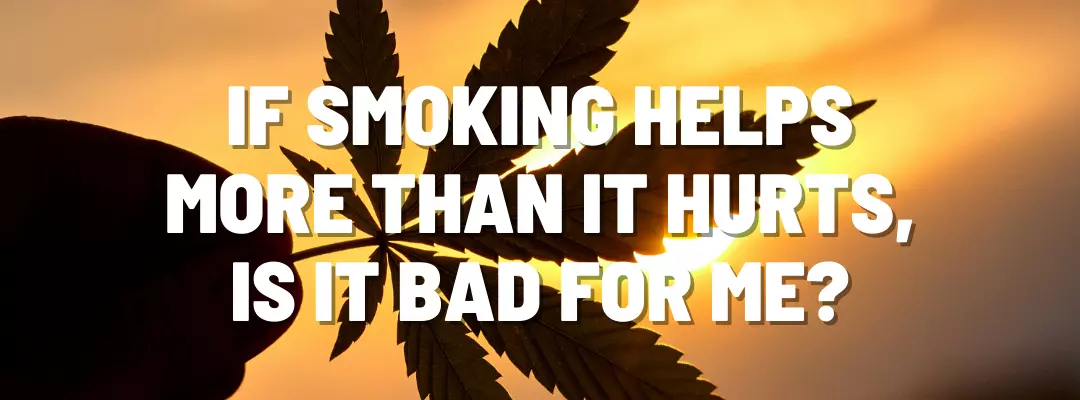As we all ring in the new year together, some people make resolutions to better themselves and their health. If you resolved to quit weed because you think it’ll make you healthier, you might not be on the right track.
Not only are there healthy alternatives to smoking weed, but there are also health benefits from consuming cannabis. To learn more and understand if quitting is the right choice for your life, read this article on the right and wrong reasons to quit weed.
Alternatives to Smoking
If you’re stepping away from weed because of its effects on your lungs, you don’t have to! The cannabis community has found, so many innovative ways to consume cannabis that doesn’t require you to inhale it.
Cannabis’ Effect on Lung Health
Let’s first discuss how cannabis smoke impacts your lungs.
Those quitting for lung health reasons aren’t incorrect in their assumptions the smoke damages your lungs. But, there isn’t a plethora of research the way there is on tobacco smoke, which is definitely worse.
Some experts believe inhaling cannabis smoke can lead to bronchitis and weaken your lung’s first line of defense against disease and harm. But other studies have found evidence inhaling cannabis can improve lung function by increasing lung capacity.
Improved lung function was found in occasional smokers, that consumed cannabis less than five times a month. Heavy users, those that smoke every day, were the ones that exemplified the adverse effects on lung health.
Other Methods of Consumption
Luckily, quitting smoking doesn’t necessarily equal quitting weed.
- Tinctures
- Topicals
- Edibles
- Capsules
- Suppositories
- Sublingual
If smoking is why you quit, consider switching your cannabis habits to include one or more of the options listed above.
🍃 Save Big with Cannabis Deals
Get all of your favorite products at an affordable price.
Health Benefits of Cannabis
Using cannabis has health benefits both physical and mental that can provide peace and comfort to many people suffering from a wide array of conditions.
Improves Mental Health
Mental health conditions like anxiety, depression, PTSD, Alzheimer’s, ADD, ADHD, and autism can be helped through cannabis use. And many more mental health conditions could be lessened through cannabis.
Cannabis users often note the relaxing, euphoric, and positive state that cannabis puts them in, so it isn’t too surprising weed can help those with mental struggles. One of the most promising uses of weed is to treat PTSD. After using cannabis for one year, many diagnosed with PTSD reported a massive decrease and symptoms.
Many PTSD patients that regularly took up weed no longer met the criteria for a PTSD diagnosis because of the relief the cannabis use brought.
More than 41 million American adults suffer from anxiety, and more than 17 million suffer from depression. As more people fall victim to these mental conditions that can be debilitating, more turn to the positive, light-hearted effects cannabis can have on their mental state.
Many people that suffer from mental illnesses naturally gravitate toward cannabis without fully understanding the way it can help their mental state.
Relieves Chronic Pain
Cannabis is known as a pain reliever and can help those suffering from glaucoma, MS, cancer, tumors, Parkinson’s, broken bones, seizures, arthritis, Hepatitis C, and inflammatory bowel diseases, to name a few.
Not only can cannabis relieve pain, but in some cases, it can work to improve these conditions and help cure the patient of all symptoms. There’s evidence of cannabis use helping to mend broken bones or fractures. They also reduce the symptoms of shaking in Parkinson’s patients.
Medicinal cannabis was once reserved for cancer patients and the severely ill, but cannabis can also aid in lesser ailments like headaches and migraines or mild yet persistent pain like aches from arthritis.
Helps Manage Withdrawal
Weed addiction is possible, but weed is also often used to relieve withdrawal symptoms for those quitting other substances or harder drugs like alcohol, heroin, or methamphetamines. Cannabis can function as a less-potent substitute that doesn’t cause intense highs or symptoms.
Walking away from a life-threatening addiction is harder than most can imagine, and cannabis can be a cushion to the harsh blow of withdrawals, but not a cure.
Other Benefits
Despite the notorious ‘munchies’, most cannabis users are a healthy weight and cannabis can even help you lose weight. It aids in managing insulin and boosting your metabolism.
Because cannabis can regulate your insulin, it can also prevent and help manage diabetes.
When It Is Time to Quit
First, let’s talk about when it is the right time to quit. These are the signs you are addicted to cannabis and may need to pull back or quit:
Obsessive Thoughts
If you spend all day every day thinking about the next time you can smoke and are consumed by discomfort when you are unable to smoke; this could be a sign of addiction.
Loss of Control
If you feel you want to stop or take a break but find that you can’t this is a sign of addiction. This could manifest in driving very far or paying absurd amounts that you know are unreasonable to get weed.
Disregard of Harmful Consequences
If you can’t keep a job or maintain relationships due to your cannabis use, this shows a complete disregard of the negative consequences. If you are willing to let your life fall apart around you while you smoke, you may be addicted.
If your cannabis use has spiraled out of control and you feel you are experiencing the consequences noted above, consider reaching out to a professional to help you through this transition.
Final Thoughts
If weed isn’t negatively affecting your life and preventing you from functioning, there isn’t strong evidence to suggest that quitting will drastically improve your health.
It’s important to reflect on your personal cannabis use to determine if it may qualify as an addiction. Recognizing your problem is often the hardest part; I know such a cliche, but it’s true.
And if you are under the impression weed is inherently unhealthy, you may be basing your information on old myths or societal stigmas. You can still consider changing your smoking method if this will make you feel healthier about your cannabis use.










